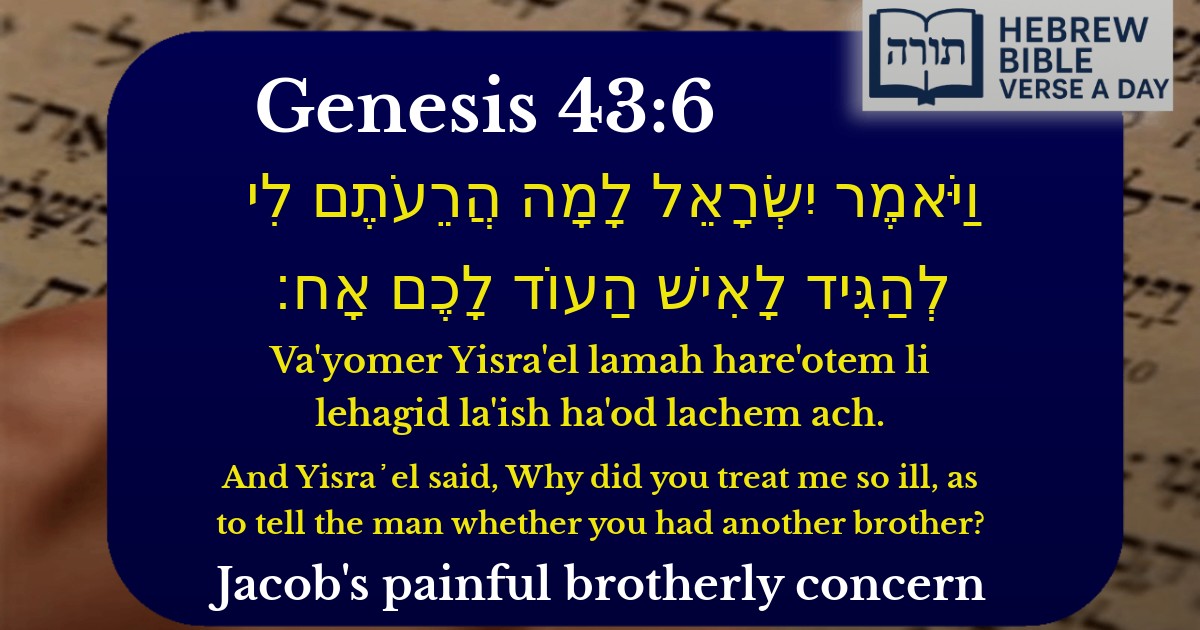Join Our Newsletter To Be Informed When New Videos Are Posted
Join the thousands of fellow Studends who rely on our videos to learn how to read the bible in Hebrew for free!
Hebrew Text
וַיֹּאמֶר יִשְׂרָאֵל לָמָה הֲרֵעֹתֶם לִי לְהַגִּיד לָאִישׁ הַעוֹד לָכֶם אָח׃
English Translation
And Yisra᾽el said, Why did you treat me so ill, as to tell the man whether you had another brother?
Transliteration
Va'yomer Yisra'el lamah hare'otem li lehagid la'ish ha'od lachem ach.
Hebrew Leining Text
וַיֹּ֙אמֶר֙ יִשְׂרָאֵ֔ל לָמָ֥ה הֲרֵעֹתֶ֖ם לִ֑י לְהַגִּ֣יד לָאִ֔ישׁ הַע֥וֹד לָכֶ֖ם אָֽח׃
וַיֹּ֙אמֶר֙ יִשְׂרָאֵ֔ל לָמָ֥ה הֲרֵעֹתֶ֖ם לִ֑י לְהַגִּ֣יד לָאִ֔ישׁ הַע֥וֹד לָכֶ֖ם אָֽח׃
🎵 Listen to leining
Parasha Commentary
📚 Talmud Citations
This verse is not quoted in the Talmud.


Context of the Verse
This verse (Bereshit 43:6) appears in the narrative where Yaakov (Yisra'el) is speaking to his sons after they returned from Egypt without Shimon and were told by Yosef (disguised as the Egyptian viceroy) that they must bring Binyamin to secure Shimon's release. Yaakov expresses distress over their revelation that they had another brother (Binyamin), which now puts Binyamin at risk.
Yaakov's Distress and Rebuke
Rashi explains that Yaakov's question, "Why did you treat me so ill?" reflects his anguish over the potential loss of Binyamin, Rachel's remaining son. Yaakov feared that just as Yosef was lost, Binyamin might also be taken from him. The Midrash (Bereshit Rabbah 91:10) elaborates that Yaakov suspected his sons of acting carelessly by revealing their family situation, thereby endangering Binyamin.
The Significance of Revealing Binyamin
Yaakov's Emotional State
The Kli Yakar highlights that Yaakov's use of the phrase "לָמָה הֲרֵעֹתֶם לִי" ("Why did you treat me so ill?") conveys deep personal pain. Yaakov, still grieving over Yosef, could not bear the thought of losing another son from Rachel. The Or HaChaim notes that Yaakov's distress was compounded by his lack of trust in his sons after the earlier tragedy of Yosef.
Brotherly Responsibility
The Talmud (Chullin 91b) connects this verse to the broader theme of brotherly responsibility. Yaakov's rebuke implies that the brothers should have been more protective of Binyamin, just as they should have been with Yosef. This moment serves as a reflection on their past actions and their duty toward one another.